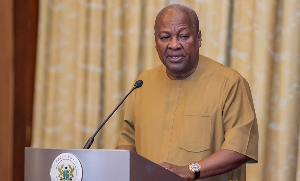Opinions of Saturday, 21 October 2017
Columnist: Samson Lardy ANYENINI
Samson’s Take: The bloodletting chieftaincy feuds; House of Chiefs failing Ghana?
Today, I question the usefulness of the National House of Chiefs for its obvious neglect of the duty imposed on it by the Constitution, and which neglect is largely to blame for the rampant endless chieftaincy feuds that continue to draw precious blood.
The framers of the 1992 Constitution certainly were aware of chieftaincy fights and crisis that have almost always resulted from succession to skins and stools and therefore provided what should be a formidable solution. They, in Article 272, handed the National House of Chiefs the mandatory mandate to “undertake the progressive study, interpretation and codification of customary law with a view to evolving, in appropriate cases, a unified system of rules of customary law, and compiling the customary laws and lines of succession applicable to each stool or skin.”
It cannot be gainsaid that this duty if properly comprehensively conclusively carried out should end the conflicts that have and continue to deprive communities of peace, trade, commerce and the needed development including basic social amenities. Teachers, doctors, and other professionals refuse postings to particular communities all because of chieftaincy recurring conflicts there and no one can blame them. The state has had to spend a fortune in providing security in these communities when such could have been invested in improving infrastructure to propel development in those communities.
What is known to be the common law and so very well developed in England and which forms a greater body of laws for not only England but other countries like Ghana apparently came about as a result of a project similar to the job entrusted the National House of Chiefs by the Constitution.
The National House of Chiefs has been blessed with intellectual and respected statesmen as its president over the period. I hope the current president, Togbe Afede XIV; younger, progressive and celebrated entrepreneur will cease the opportunity to make the august body better count and be better remembered. His tenure should more actively pursue a conclusive fulfilment of this onerous but privileged duty by handing Ghana what Article 272 (b) requires of the National House of Chiefs. This duty also entails the job in Article 272 (c) to “undertake an evaluation of the traditional customs and usages with a view to eliminating those customs and usages that are outmoded and socially harmful.”
I dare say the duty to provide “a unified system of rules of customary law, and compiling the customary laws and LINES OF SUCCESSION applicable to each stool or skin” is far more important and worthy of total dedication to achieve comprehensively conclusively than its function as a court of appeal in a “cause or matter affecting chieftaincy which has been determined by the Regional House of Chiefs.” Emphasis added.
How many regimes of chieftaincy ministries must Ghana go through to assist the house comprising of five paramount chiefs from each of the 10 regions to give the country such a legacy?
In his recently launched book entitled CONSTITUTIONAL LAW OF GHANA: TEXT, CASES, & COMMENTARY, Dean of the GIMPA Law Faculty, Ernest Kofi Abotsi, discusses some of the cases in which the Supreme Court laments the chieftaincy feuds despite the clear provision in Article 277 of who qualifies to be a chief. Truth is, a compilation of LINES OF SUCCESSION plus a determination of the CUSTOMARY LAW and USAGES are most critical to give full meaning to that definition that a chief is “a person, who, hailing from the appropriate family and lineage, has been validly nominated, elected or selected and enstooled, enskinned or installed as a chief or queen mother in accordance with relevant customary law and usage.”














